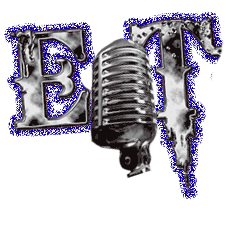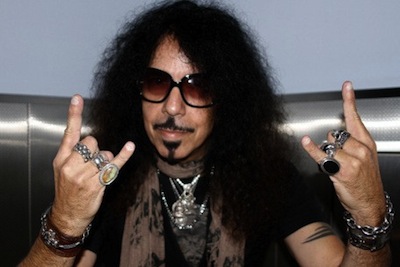Greg Prato of Songfacts spoke with Quiet Riot drummer Frankie Banali. Portions of the interview appear below.
Greg Prato (Songfacts): How would you compare the songwriting process of the current QR lineup to the classic lineup from the ’80s?
Frankie Banali: First of all, I think you have to understand, when I started playing with Kevin DuBrow in 1980, we were working on songs through that whole period of time – mostly Kevin, because he was the main songwriter. So we had two years of fleshing out those songs – both at rehearsals and playing live, because we did a lot of dates in Hollywood at the time. So by the time we went in to record the Metal Health record, all of that material was really, really fleshed out. Very little of it got written in the later stages.
When it came to Condition Critical, that was much more difficult, because we were out on the road for two days shy of a year straight. We started the Metal Health tour in Hollywood on March 17th and 18th, and we ended in Munich on March 15th of the following year, and we went straight into the studio to record Condition Critical. By the time we got to QR III, we had some down time, and we had some outside writers, so it just evolved as the situation developed.
Now, it’s a little different. Let’s say it was the classic Metal Health lineup. Everybody was living in LA, whereas now, our guitarist lives in Las Vegas, Chuck lives in LA, I live in LA, and James lives in Northern California. So it’s not as easy to get together. On the Road Rage record, the majority of the music was written by myself and my writing partner, Neil Citron. Chuck contributed to one of the songs, and Alex wrote one song with James.
The dynamics change based on how the industry has changed, because now with the internet, cell phones, and all of those things, you no longer have to live in the same city to really be able to function. So that has changed the dynamics of songwriting.
Songfacts: Although James has been in the band for only a short while, how do you compare him to Kevin as a vocalist?
Frankie: It’s a really interesting thing. First of all, before we even get into the vocal situation, he reminds me of Kevin a lot. Kevin was really hyper – a ton of energy – and James has a ton of energy. Kevin was 6’4″, and I think James is 6’4″. So from that perspective, it kind of reminds me of Kevin. I used to call Kevin “my goofy kid,” because he was as goofy as the day is long… in a good way.
Vocally, the amazing thing about it is I didn’t have James join the band to have a clone of Kevin. I wanted somebody who had the vocal range that Kevin had, because the amazing thing about Kevin was he had those soaring highs, but then he had that growly low. And that is something that James has within his own style. So while it does sound like Quiet Riot when we do the songs, James brings his own personality and his own thumbprint to the old catalog, which I really, really like.
Songfacts: You are credited as one of the songwriters of one of Quiet Riot’s biggest hits, Metal Health (Bang Your Head).
Frankie: Kevin and I spent a lot of time working on that song, and at that point in time, we were huge fans of AC/DC, so we wanted something that had a very simple, straight ahead groove at a certain tempo. And then Kevin just ran with the lyrics, mostly from personal experiences. Especially the line, “I’ve got a mouth like an alligator,” because as we all know, Kevin spoke his mind quite often.
It went through a lot of different changes, and what I mean by “changes,” a lot of that song has to do with the tempo. I listen to a lot of classical music and jazz, and the thing that I found interesting about both classical music and jazz is that certain parts of a song only work at a certain tempo, and they don’t work at another tempo. With jazz, they shift gears – the same thing with classical. With rock ‘n’ roll, you basically start at a tempo and you end at that tempo. So the tempo on that record is not slow, but it really digs into the groove. It didn’t work at that tempo live, which is why we actually played it a little faster live – because it gets the energy of the audience. So that is something that we paid attention to.
And at one point, the song was much longer than it is now. Kevin was really good about trimming fat.
Songfacts: Is it true that it was you who came up with the opening drum pattern – later performed by Lee Kerslake, but credited to Tommy Aldridge – on the Ozzy Osborne song, Over the Mountain?
Frankie: Yes. How that came about was really interesting. I had an apartment in West Hollywood – this small, one-bedroom apartment – and I was having to hustle as many gigs as I could and as many sessions as I could just to meet my monthly rent while all my other friends were still couch-surfing. I get a call one morning… from Randy Rhoads.
Randy had a really low voice. Everybody thinks he had a high voice because he was a tiny little guy, but he had a really low voice. He goes, “Frankie, do you want to play with Ozzy?” And I said, “The guy from Black Sabbath?” He says, “Yeah.” I go, “OK! I have my drums, but I don’t have a car.”
So he borrowed a car that was big enough. He came and picked me up and we went down to rehearsals. And when I say, “pick me up,” he picked me up with my 1969 green Ludwig sparkle set with a 26-inch bass drum. I brought a gong – the whole thing. We went to this rehearsal studio called Mars – on Melrose and Western – and we rehearsed for about a week. It was interesting. It was great to play with Randy, and the bass player oddly enough was Dana Strum, who eventually became the bass player in the Vinnie Vincent Invasion and then Slaughter. Essentially, that was the band.
Ozzy was interesting – he was nothing like what I expected. He was quiet and he sat down on a piano bench with a little ghetto blaster, and he was recording essentially everything we were doing. That ended up becoming Over the Mountain, which at that time wasn’t really fleshed out. A lot of those parts were guitar parts that Randy brought in from older Quiet Riot songs from the ’75-’79 period, and that triplet thing is something that I was doing at every session because I figured, “If it ever comes out, I’m finally going to get it on a record,” because I really enjoyed it. It’s derivative of the “John Bonham triplet.” John Bonham is one of my favorite drummers, so that’s how that came about.
Now, originally, they were going to record the record in LA, but Jet Records had spent so much money flying Ozzy between London, LA, and New York looking for musicians and they were really unsure what Ozzy’s future was going to be. Ultimately, they decided to just record it in England, because it would be less expensive, and they would only pay to fly one guy over. And obviously, “the guy” was Randy Rhoads. That was my brush with Ozzy-ness, so to speak.
The interesting thing about that one is, I read – I think it was in Bob Daisley’s book [For Facts Sake] – that it’s nonsense and that I didn’t come up with that drum part, that he was there when Lee Kerslake – who is a friend that I really love, from Uriah Heep – came up with the drum part. It is fascinating that Bob Daisley would say something like this, because this happened a year before he was involved with the band, and he wasn’t in Hollywood. So, how could he pass judgement like that? I know what I played.
In ’87, Kevin and I were doing press for the QR III record, and Ozzy was doing press. It was at a Mexican restaurant on Melrose in Hollywood. Ozzy pointed to me, and he goes – I’m paraphrasing, but something to the effect of – “That’s the bloke that came up with the drum part that Lee recorded, that Tommy Aldridge got all the credit for!”
Read more at Song Facts.
Quiet Riot released their latest CD. Road Rage, on August 4th. Read more about it, here.
source: songfacts.com


6 Responses
Quiet Riot should be in the rock and roll hall of fame dammit! Not!! They had several hits most of which were cover songs. The rest of there songs were filler and totally blowed.